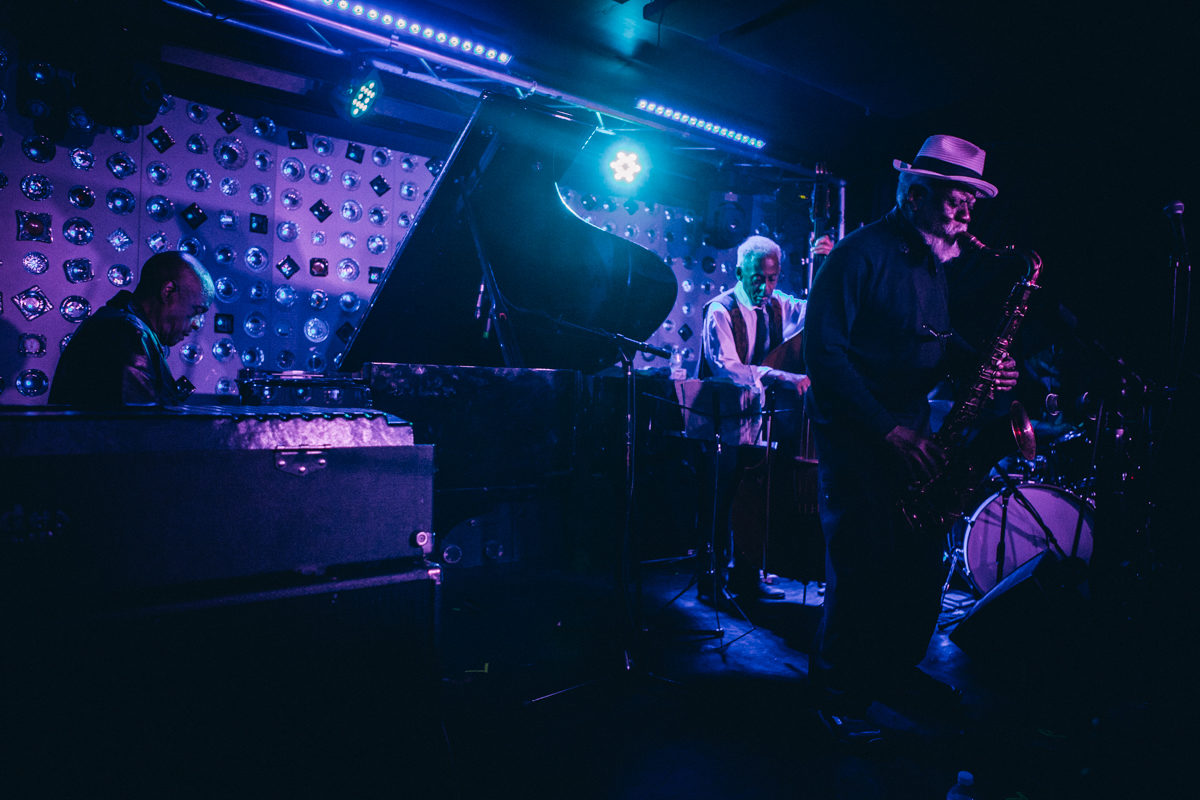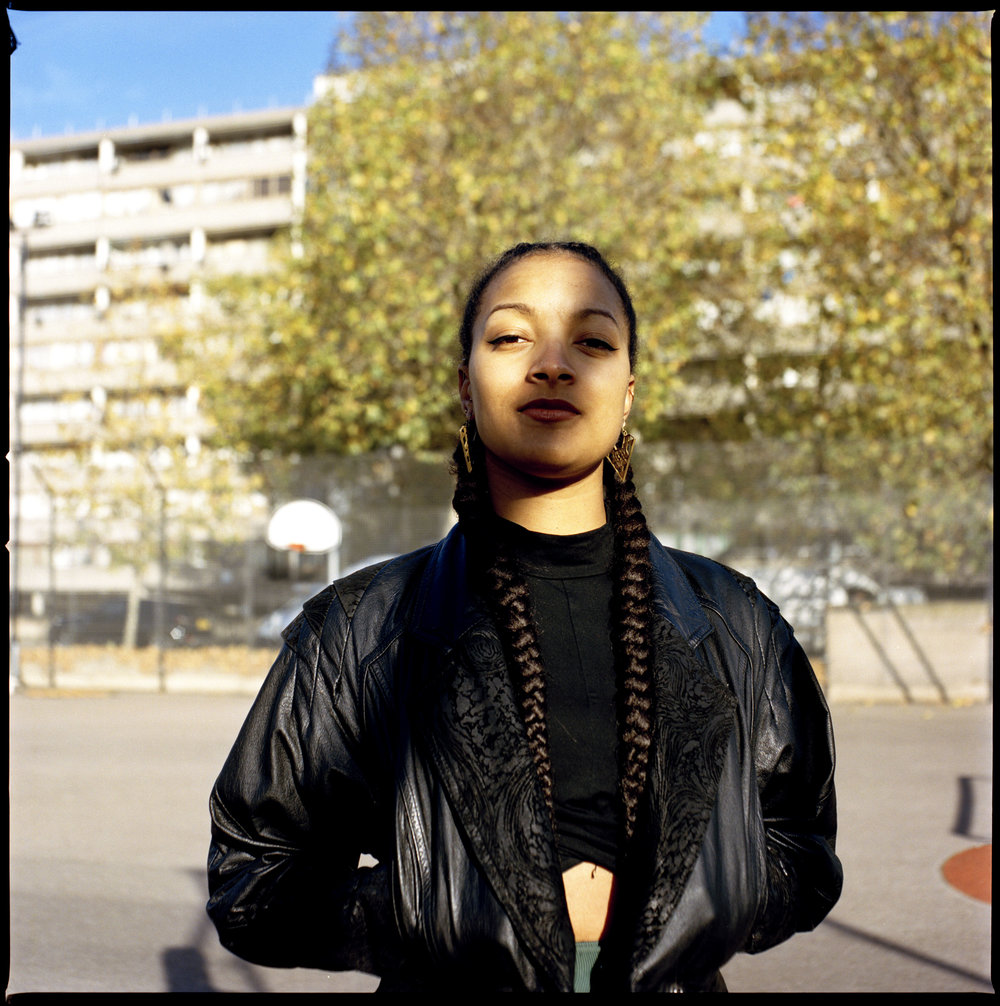NYC Winter Jazzfest Presents
Jan
10
with Pharoah Sanders & Nubya Garcia
Thu January 10th, 2019
8:00PM
Main Space
Minimum Age: 18+
Doors Open: 7:00PM
Show Time: 8:00PM
Event Ticket: $40
Day of Show: $50
In 1968, a 28-year-old Gary Bartz recorded his second album for the Milestone label, Another Earth featuring himself on alto saxophone, Charles Tolliver on trumpet, Pharoah Sanders on tenor saxophone, Stanley Cowell on piano, Reggie Workman on bass and Freddie Waits, drums (Waits is the late father of frequent NYC Winter Jazzfest bandleader and sideman, drummer Nasheet Waits).
Another Earth was recorded prior to Bartz famously joining Miles Davis in 1970 at the Isle of Wight. He had previously performed with Eric Dolphy, McCoy Tyner, Charles Mingus’ Jazz Workshop, Max Roach, Abbey Lincoln and Art Blakey’s Jazz Messengers. Following his appearance on Davis’ “Live-Evil,” he went on to form Ntu Troop, which combined jazz, funk and soul and played with countless giants of the music, in the process becoming one himself. Winter Jazzfest collaborates with Revive Music to realize this 50th anniversary show with full lineup to be determined.
This is a general admission, standing room event.
In the spirit of supporting our jazz community and celebrating the life and music of the late Roy Hargrove we are committing our full attention on January 8th to the Memorial Celebration of Roy Anthony Hargrove.
Thus we are rescheduling the concert date of Gary Bartz Plays Another Earth with Featured Guest Pharoah Sanders to January 10th (originally scheduled on January 8th).
Roy Anthony Hargrove
(October 19, 1969 – November 2, 2018)
Memorial Celebration
at The Cathedral of St. John The Divine
1047 Amsterdam Avenue at 112th Street
Tuesday, January 8, 2019 at 7pm
Please join us!
Thank you,
Winter Jazzfest + Revive Music + Le Poisson Rouge
Gary Bartz 50-Year Anniversary of Another Earth

A native of Baltimore, Gary Bartz ventured to New York City to attend the Juilliard School in 1958. At the time, performers such as Thelonius Monk, Ornette Coleman, and Miles Davis were playing at Birdland and the city’s other premiere clubs every night, and Bartz regularly snuck in to see them.
In the 1960s, Bartz joined the Max Roach/Abbey Lincoln Group and the Charles Mingus Jazz Workshop, quickly earning a reputation as the greatest alto saxophonist since Cannonball Adderley. In 1965, after meeting the group at his parents’ nightclub, Bartz joined Art Blakey’s Jazz Messengers and recorded Soulfinger, his recording debut. Around the same time, he began working with McCoy Tyner, and their relationship deepened the influence of John Coltrane on Bartz.
In 1970, Bartz received a call from Miles Davis, who asked Bartz to perform with his band at the historic Isle of Wight Festival. In the same year, Bartz also formed his own group, Ntu Troop, after the Bantu word for “unity.” Ntu blended soul, funk, African folk music, hard bop, and avant-garde jazz on such albums as I’ve Known Rivers and Other Bodies, based on the poetry of Langston Hughes, as well as Music is My Sanctuary, Love Affair, Another Earth, and Home.
Overall, Bartz has recorded more than 40 solo albums and over 200 as a guest artist. More recently, he released Coltrane Rules: Tao of a Music Warrior, Live at the Jazz Standard Volume 1 and Volume 2, and several others, on his own label, OYO, which is named for the Nigerian tribe and the acronym “Own Your Own.” He was also spotlighted in the “Blindfold Test” section of DownBeat magazine in January 2008, and he continues to perform with McCoy Tyner in such cities as Tokyo and Los Angeles.
Pharoah Sanders

Pharoah Sanders official site | Pharoah Sanders on Facebook
Pharoah Sanders possesses one of the most distinctive tenor saxophone sounds in jazz. Harmonically rich and heavy with overtones, Sanders’ sound can be as raw and abrasive as it is possible for a saxophonist to produce. Yet, Sanders is highly regarded to the point of reverence by a great many jazz fans. Although he made his name with expressionistic, nearly anarchic free jazz in John Coltrane’s late ensembles of the mid-’60s, Sanders’ later music is guided by more graceful concerns.
The hallmarks of Sanders’ playing at that time were naked aggression and unrestrained passion. In the years after Coltrane’s death, however, Sanders explored other, somewhat gentler and perhaps more cerebral avenues — without, it should be added, sacrificing any of the intensity that defined his work as an apprentice to Coltrane.
Pharoah Sanders (his given name, Ferrell Sanders) was born into a musical family. Sanders’ early favorites included Harold Land, James Moody, Sonny Rollins, Charlie Parker, and John Coltrane. Known in the San Francisco Bay Area as “Little Rock,” Sanders soon began playing bebop, rhythm & blues, and free jazz with many of the region’s finest musicians, including fellow saxophonists Dewey Redman and Sonny Simmons, as well as pianist Ed Kelly and drummer Smiley Winters. In 1961, Sanders moved to New York, where he struggled. Unable to make a living with his music, Sanders took to pawning his horn, working non-musical jobs, and sometimes sleeping on the subway. During this period he played with a number of free jazz luminaries, including Sun Ra, Don Cherry, and Billy Higgins.
In 1964, Coltrane asked Sanders to sit in with his band. The following year, Sanders was playing regularly with the Coltrane group. Coltrane’s ensembles with Sanders were some of the most controversial in the history of jazz. Their music represents a near total desertion of traditional jazz concepts, like swing and functional harmony, in favor of a teeming, irregularly structured, organic mixture of sound for sound’s sake. Strength was a necessity in that band, and as Coltrane realized, Sanders had it in abundance.
Sanders made his first record as a leader in 1964. After John Coltrane’s death in 1967, Sanders worked briefly with his widow, Alice Coltrane. From the late ’60s, he worked primarily as a leader of his own ensembles.
In the decades after his first recordings with Coltrane, Sanders developed into a more well-rounded artist, capable of playing convincingly in a variety of contexts, from free to mainstream. Some of his best work is his most accessible. As a mature artist, Sanders discovered a hard-edged lyricism that has served him well.
Nubya Garcia

Nubya Garcia Official Website | Nubya Garcia on Facebook | Nubya Garcia on Twitter | Nubya Garcia on Instagram
London-based saxophonist and composer, Nubya Garcia, is one of the leading forces behind the resurgence of jazz-influenced sounds in the UK. Raised in a creative environment built by a set of Caribbean parents, her brand of afro-tinged Jazz has made her a key component in a string of new and established groups: from work with MOBO Award-winning drummer, Moses Boyd, legendary Jungle producer and toaster, Congo Natty, through to her own works as part of six-piece, Maisha, and the Nérija septet.
Nubya fearlessly threw herself head first into this 5ive project, her debut recording, with a clear vision of what she wanted and was meticulous in her pursuit of her sound. Enlisting the help of fellow musical comrades from an exciting new wave of London based talent, Nubya tapped into well-seasoned, harmonious relationships with players that know and understand her – and this joyful union radiates through her compositions.

